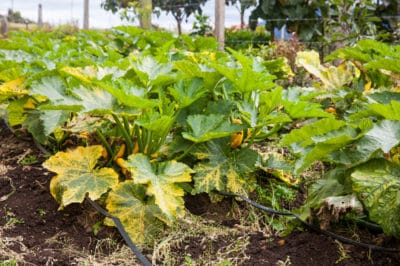Viruses, Bacteria, and Fungi
Typically, yellowing is a sign that your plants are sick. There are a variety of plant diseases that can cause yellowing, but you can often determine which is to blame by the pattern of damage that they cause.
- Cucumber Mosaic Virus: As the name implies, this disease doesn’t just affect zucchini, but a whole range of plants in the cucumber family. It causes yellow-brown, brittle patches that are scattered across the leaves. Unfortunately, there’s no treatment for this disease, so it’s best to remove any affected plants quickly.
- Powdery Mildew:This very common fungal disease at first just looks like a dusty coating on the plant’s leaves. As the fungus continues to leech nutrients from the leaves, however, they begin to curl and grow yellow. If you spot the tell-tale, soap-scum like coating, treat your plants with neem oil.
- Bacterial Wilt: This tough-to-eradicate disease is caused by the bacterium Erwinia tracheiphila. It is spread by cucumber beetles, and causes infected plants to rapidly yellow, wilt, and die. Affected plants need to be removed and destroyed to prevent spreading the disease, but you can help prevent it by using row cover to keep beetles at bay.
Insect Damage
Large insects are more likely to cause holes than yellowing, but small insects like aphids or spider mites can be to blame. Check beneath leaves to see if these tiny pests are damaging your plants. Other signs include tiny black smears on the leaves, which are left by aphids, or the messy silk webs of spider mites.
If insects are at work among your zucchini plants, treat them with a spray of insecticidal soap or neem oil. These are quite effective against pests, but are less damaging to beneficial insects like bees and butterflies.
Nutritional Deficiencies
Zucchini plants are what is known as “heavy feeders,” meaning they require extra micronutrients in their soil to grow healthy and strong. If you don’t see insect damage in your yellowing plants, or if the first leaves affected are new growth, you can suspect that deficiencies in nutrients like manganese, sulfur, or iron are to blame.
The best way to treat nutritional deficiencies is actually to prevent them. Blending compost into your garden each spring is usually enough to provide the nutrients your plants need. For struggling plants, however, you can give a mid-season boost with a fertilizer like fish or bone meal, or kelp fertilizer, which are are higher in micronutrients than chemical fertilizers.
